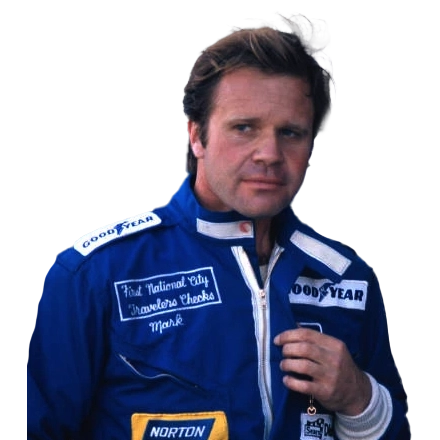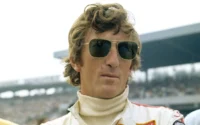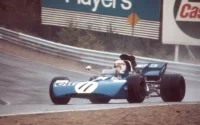Mark Donohue, affectionately dubbed “Captain Nice,” was that rare breed of racer who could not only drive a car to its limits but build and tune it to perfection himself. A mechanical engineer by training and a speed junky by instinct, Donohue became one of the most technically brilliant and versatile American drivers of his era.
| Nationality | American |
|---|---|
| Born | Mark Neary Donohue Jr. 18 March 1937 Haddon Township, New Jersey, U.S. |
| Died | 19 August 1975 (aged 38) Graz, Austria |
Donohue is perhaps best remembered for creating and mastering the monstrous, 1,500+ bhp Porsche 917-30, known as the “Can-Am Killer”, and for conquering the Indianapolis 500 in 1972.
His driving résumé reads like a tour through the golden age of motorsport: AMC Javelin, AMC Matador, Chevrolet Camaro, Eagle-Offy, Elva Courier, Ford GT40 Mk IV, Ferrari 250LM, Ferrari 512, Lola T70, Lola T330, Lotus 20, McLaren M16, Porsche 911, Porsche 917/10, Porsche 917/30, Shelby Cobra, and Shelby Mustang GT350R. If it had wheels and horsepower, Donohue probably raced it, and probably made it faster.
Formula One, and the Relentless Pursuit of Speed
By the end of 1973, the brutal pace of developing and racing the Porsche 917/30 had taken its toll. The tragedy surrounding the 1973 Indianapolis 500 and the loss of his close friend Swede Savage left Donohue deeply shaken. He announced his retirement from racing after the 1973 Can-Am season, seemingly ready to leave the cockpit behind.
But speed has a way of calling its faithful home. When Roger Penske launched his Formula One effort, Penske Cars Ltd., Donohue couldn’t resist the challenge. He returned to the grid for the final two races of the 1974 Formula One World Championship, and was set to contest the full 1975 season with the new Penske PC1.
Donohue had actually made his F1 debut years earlier, on 19 September 1971, driving a Penske-backed McLaren entered by the White Racing privateer team at the 1971 Canadian Grand Prix at Mosport Park, and promptly landed on the podium in third place. When he rejoined F1 in 1974, he placed 12th at the 1974 Canadian Grand Prix but failed to finish at the U.S. round.
The 1975 season was a tough one: flashes of brilliance (a pair of fifth-place finishes at the Swedish and British Grand Prix) were offset by reliability woes with the PC1, which forced three early retirements. Donohue and Penske’s patience was wearing thin, but neither was ready to quit.
Death
Midway through that season, Penske switched to the March 751, hoping for a turnaround. Donohue had just returned from setting a closed-course speed record at Talladega Superspeedway in Alabama when he arrived in Austria for the 1975 Austrian Grand Prix at the Österreichring.
During a practice session, disaster struck. A tyre failure sent his car off at Turn 1 (Vöest Hügel Kurve) and into the catch fencing. A marshal was tragically killed by debris, and although Donohue initially seemed only mildly injured, his condition deteriorated overnight. After complaining of a worsening headache, he was taken to a hospital in Graz, where a cerebral haemorrhage left him in a coma. He died the following day, 19 August 1975, at just 38 years old.
He left behind his second wife and two sons from his first marriage, and was laid to rest in St. Teresa Cemetery, Summit, New Jersey.
In the aftermath, the corner where the crash happened was reprofiled into the Hella Licht Esses in 1977. Donohue’s estate later filed a wrongful-death suit against Penske and Goodyear, alleging tyre failure caused the crash. The case was settled in 1986, with Goodyear paying .6 million to his widow and children.
Mark Donohue’s Formula One World Championship Career
| Active years | 1971, 1974–1975 |
|---|---|
| Teams | Penske-entered McLaren and March chassis, Penske |
| Entries | 16 (14 starts) |
| Championships | 0 |
| Wins | 0 |
| Podiums | 1 |
| Career points | 8 |
| Pole positions | 0 |
| Fastest laps | 0 |
| First entry | 1971 Canadian Grand Prix |
| Last entry | 1975 Austrian Grand Prix |
Mark Donohue Teammates
| 1 driver | Involvement | First Year | Last Year |
|---|---|---|---|
| David Hobbs | 1 | 1971 |
Mark Donohue Complete Formula One Results
| Year | Entrant | Chassis | Engine | 1 | 2 | 3 | 4 | 5 | 6 | 7 | 8 | 9 | 10 | 11 | 12 | 13 | 14 | 15 | WDC | Points |
|---|---|---|---|---|---|---|---|---|---|---|---|---|---|---|---|---|---|---|---|---|
| 1971 | Penske / K.F. White Racing | McLaren M19A | Ford V8 | RSA | ESP | MON | NED | FRA | GBR | GER | AUT | ITA | CAN 3 | USA DNS | 16th | 4 | ||||
| 1974 | Penske Cars | Penske PC1 | Ford V8 | ARG | BRA | RSA | ESP | BEL | MON | SWE | NED | FRA | GBR | GER | AUT | ITA | CAN 12 | USA Ret | NC | 0 |
| 1975 | First National City Bank Team | Penske PC1 | Ford V8 | ARG 7 | BRA Ret | RSA 8 | ESP Ret | MON Ret | BEL 11 | SWE 5 | NED 8 | FRA Ret | 15th | 4 | ||||||
| March 751 | Ford V8 | GBR 5 | GER Ret | AUT DNS | ITA | USA |



